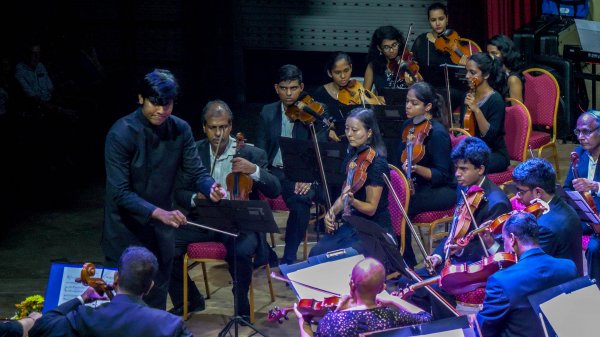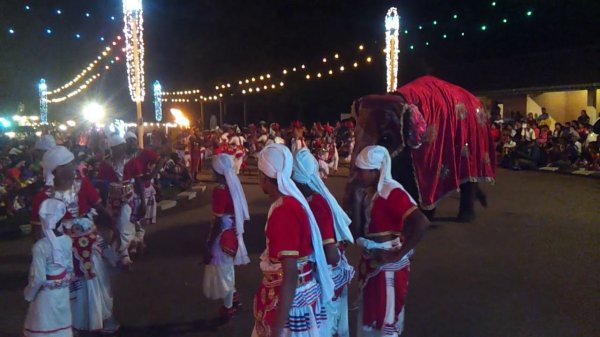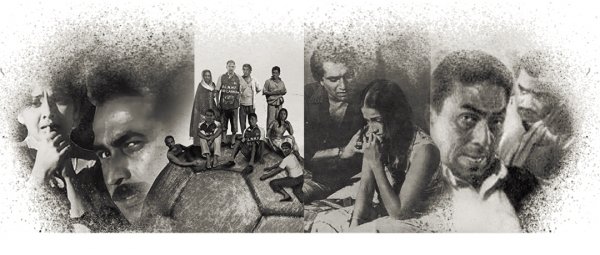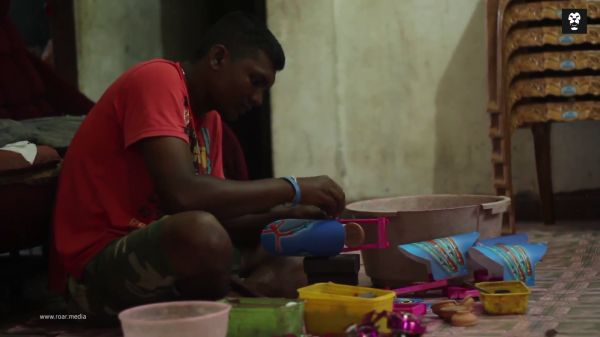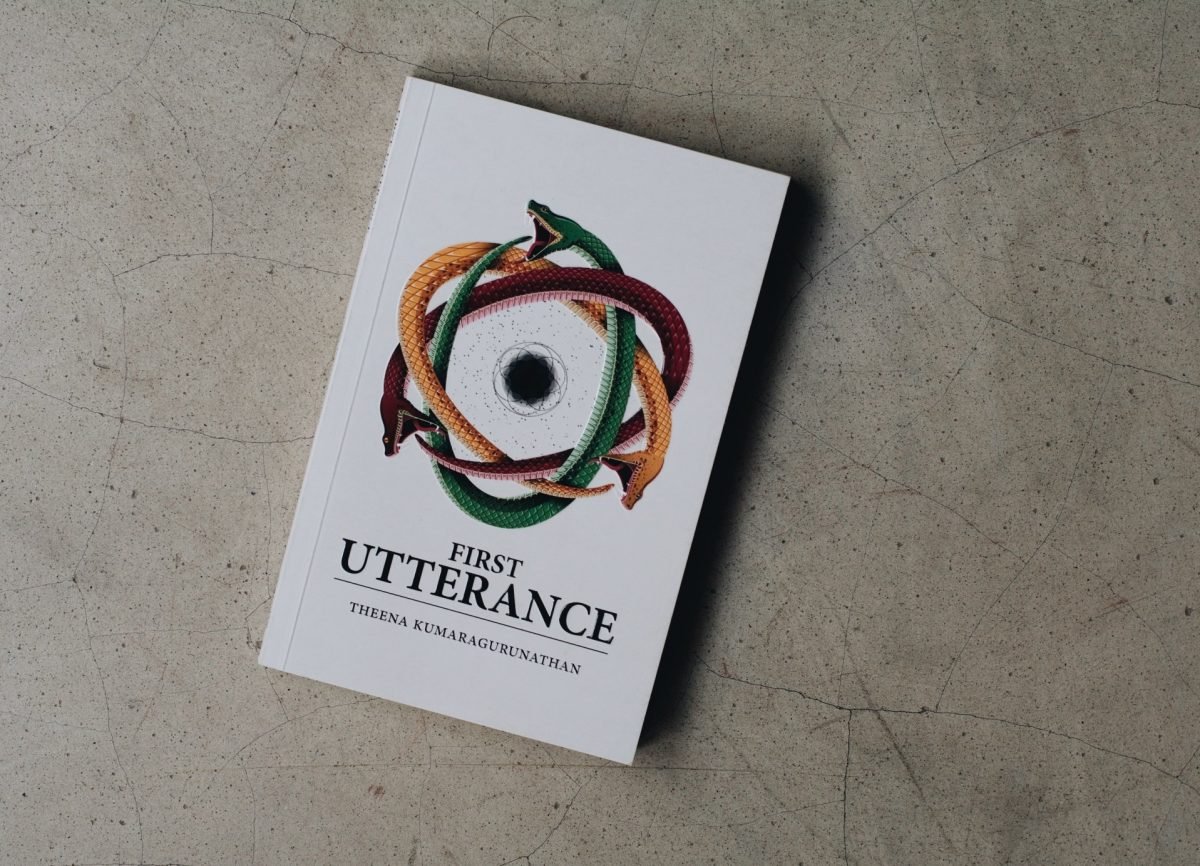
The mark of a truly imaginative poet would be his or her perception of what God did on the eighth day. Theena Kumaragurunathan has indeed explored beyond the prescribed seven-day narrative that has been inculcated in us, in more than one way. Not only has he, finally, released Sri Lankan literature from the shackles of the ethnic conflict, the tsunami, Shyam Selvadurai’s funny ghosts, and Ashok Ferry’s neighbours in Colpetty, he has also released Sri Lankan fiction from the boundaries of “genre”, imposed by mainstream publishers on writers, by self-publishing the novella ‒ and, in an ironic turn of events, it has even gained their recognition when he was awarded the Fairway National Literary Award (English) at the Galle Literary Festival, this year.
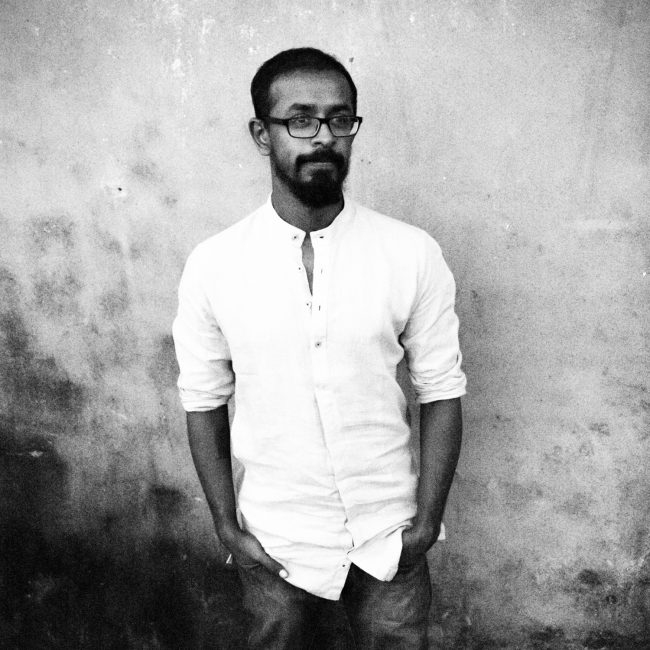
Theena Kumaragurunathan, whose novella First Utterance this month won the Fairway National Literary Award 2016. Image credit: Daran Kandasamy
The visual aesthetics of the novella, to begin with, serves as a jolt to the reader ‒ Madhri Samaranayake (illustrator), in a bold move, uses the mythology of the novella itself as the inspiration for the design of the cover, named the Triad of Ancestors. It employs a popular image that is recurrent in many cultures: the Urobori – the self-devouring serpent. For instance, in the Yoga-Kundalini Upanishad, the text from which Kundalini Yoga is derived, Kundalini or Shakti is coiled in a spiral form at the base of the spine ‒ “Like a snake, coiled round upon herself, she holds her tail in her mouth” ‒ and is said to be the energy that needs to be unlocked, or “un-spiraled”, to awaken the female principle in us to aid in reaching a higher state of being. This review is an attempt at untangling some of the more esoteric themes, which, like the Urobori, are carefully layered in the novella.
Soma And Shaivism
First Utterance – the first book in the trilogy The Miragian Cycles – opens with Cosmic Mistress: a poem of just one sentence, which establishes the mythological premise of the Cycles. The language used serves as a mode to convey the mystical undertones, not only in the opening poem, but also in the numerous motifs borrowed from Shaivism. This poem is reminiscent of the myths in Hinduism where Shiva and Parvati indulge in erotic play without progeny – which leads Parvati to create her own son, a virgin birth, by caressing her dress with two lotuses.The artwork seen in the beginning of each chapter, eerily evokes the image of Parvati’s lotuses, signifying each chapter being brought to life by the Great Goddess; by Mother Mirage – once again, the philosophy of the novella is stealthily hidden in the artwork. The virgin birth in this myth is also a clear parallel to the birth of the madman that has been burdened by the privilege of seeing the face of the father of Mirage.
Kumuaragurunathan also exploits tidbits from Vedic literature, in which one of the libations offered to the gods is an intoxicant, Soma, a concoction of extracts from multiple herbs and plants which is later consumed by the devotees themselves. Soma, which means “extract” or “droplet”, is the ambrosial victual which sustains the immortality of the gods and is also one of the many names for the moon. This drink, which plays an important role in Hindu mythology, is the catalyst which, eventually, reveals the time the name of the father should be uttered to one of the madmen; Soma ushers in the auspicious time:
“In Soma we trust.”
The Return To The Thalassa
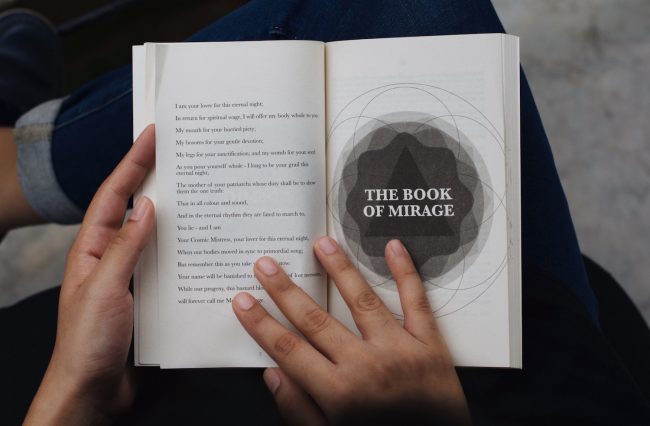
The book opens with poetry, and the story remains poetic throughout. Image credit: Roar.lk/Minaali Haputantri
First Utterance is one of the most psychoanalytically consistent novels that has been produced by a Sri Lankan. Whether consciously or not, is beside the point and it requires acknowledgment and appreciation.
Sruti, which initially may seem as a simple plot device and yet another fantastic and magical element in Kumaragurunathan’s world camouflages great nuance and depth. The word itself translates as “that which is heard” in Sanskrit and “pitch” in Tamil and Carnatic music. As simple as it may seem in the context of the novella, once again, it embodies one of the most important concepts in psychoanalysis: Freud’s polymorphous perversity, is boiled down quite aptly:
“…through Sruti she felt it, physically. As if parts of her being were coming to life for the first time. As if her body before this was no better than that of an inanimate puppet but which was now brought to life by a benign but invisible puppeteer. She told me how when she heard Sruti’s song there was an explosion of colour, shape and texture in her line of vision that seemed to engage in acts of creation and destruction sometimes at the same time. How each note had a colour…”
The Book of Mirage, the Holy text of Mirage, which the inter-tribal government uses as a scapegoat for its atrocities, effortlessly condenses Thalassa: A Theory of Genitality in its imagery. In this theory, Sandor Ferenczi postulates that the act of coitus is a symbol of regression, a symbol, on the part of man’s ego – the tripartite ancestors of Mirage, Saman, Shiva, and Adam, resembling the trident carried by Shiva – to return to the Thalassa; the sea; the womb; a state of perfect happiness:
“We dreamt together: a sea of foetaled bodies of Saman, Shiva and Adam.”
This symbol consists of a threefold identification:
1) The identification of the whole organism in the bodily function of the phallus is to actualise regression into the mother’s womb i.e. Mother Mirage:
“We walked until She cocooned us in Her maternal gloom, until we could no longer remember what was day and what was night.”
2) A hallucinatory identification with the partner:
“Mirage longed for us and we longed for Mirage.”
The name of the civilisation itself, Mirage, meaning an illusion, completes the hallucination.
3) The pleasure of coitus makes the regeneration a reality:
“We built villages in our homelands. Villages became towns as our numbers grew. The main town in each tribe’s homeland became the site of the holiest temple.”
And from this temple, in Kumaragurunathan’s novella, a dogmatic organisation grew, which later on heavily influences the unified inter-tribal government.
Ravanapura, the city in which the madmen are housed, echoes the Hindu epic Ramayana, in which the demon king of Lanka held Rama’s wife, Sita, hostage. Along with the three madmen, President Mahasen VIII is held captive by his unresolved Oedipal complex. Having lived in the shadow of his father’s legacy, his political career has largely been engineered to gain his father’s approval.
“He was a difficult man to please… My father. I was always seeking his approval.”
“…it is a son who no longer wants to be haunted by the memories of his father.”
Further, the Castration complex can be seen in the imagery evoked in the 100 Year War. In this mythology interpreted by Freud, the prehistoric sons of a tribe – here: Saman, Shiva, and Adam – band together and form a conspiracy to overthrow and kill their despot father:
“The three prophets then divided the land among their tribes.”
Having gone their separate ways and gained their own geo-political identities as farmers, tradesmen, and fishermen, the brothers band against each other – the 100 Year War – in order for a new father to rise.
Kumaragurunathan pays homage to the heritage that birthed the trilogy in the name of the father: Sri Lankāvatāraputra, at the end of the novel. This agglomerated word from Sinhala, which loosely translates as “the Spirit of the Sons of Sri Lanka”, recapitulates the chapter Thirumurti, which translates from Tamil as “the personification of a deity which is also considered holy”, where the son becomes a father himself.
A new father has risen; and the castration complex is complete.
Of Clergymen And Madmen
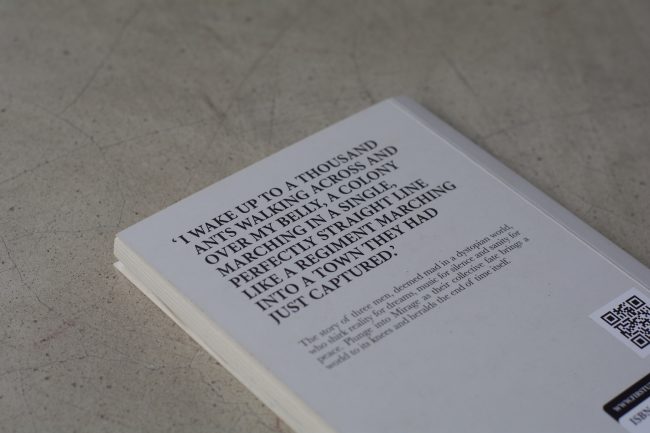
It may be a relatively short book, but the content does not feel rushed. Image credit: Roar.lk/Minaali Haputantri
Even though the novella is written such that it is meant to be read in one day, the content does not feel rushed, especially in its social criticism and acutely philosophical prose, despite its conciseness. Undeterred by the fantastic nature of this world, the writer touches on themes that are extremely relevant today, in Sri Lanka and many other countries, worldwide. The lack of freedom of the press, minorities living in fear of persecution – the white van, a phenomenon particular to Sri Lanka, and the influence of clergymen in the governing of a country – are some of them. The universal paradigm of trading in lush greenness for drab pavement is a very personal invasion for one of the madmen:
“…the Miragian nation had started cutting down trees around me, making way for more towns and suburbs in the name of economic progress.”
The blind faith that is inculcated into the populace when it comes to social institutions, whether it is the government, the economy, schools, or even marriage, starkly points to the novella’s Shaivite substratum – the status quo is rejected and the outsider is welcomed with a warm embrace:
“You are taught from a young age to keep from seeing that which is hidden in the open, and from hearing that which is lost in the cacophony of your banal conversations; you who are so fuelled by your ready subscribing to ‘objective reality’- you are the confused; and we, your madmen, we are the prophets of truth.”
The writer even takes a brave jab at not only our delusionary ability to “rationalise” but also a sharper one at politicians and the futility of wars, all in just one sentence:
“…only the logic of reasonable, sane men could send millions marching towards certain death during those one hundred years.”
Kumaragurunathan uses these as a firm foundation to build up to a world that seems like a hybrid of Mohenjo Daro and contemporary Sri Lanka. First Utterance is a genre-bending fantasy novella of a dystopian world which reads like Thus Spake Zarathustra sailing smoothly from poetry to prose before converging beautifully in a play and takes you on an acid trip of carefully crafted imagery and impenetrable symbolism that is as schizophrenic as the madmen that inhabit the world and the Soma in which they indulge. It is often said that there are only very thin boundaries between madness, poetry, and prophecy; Kumaragurunathan ticks off the first two in the content of the novella and the last by making this book not only a debut for him but also for Sri Lankan literature.
Featured image credit: Roar.lk/Minaali Haputantri

